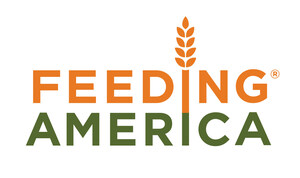
Feeding America Concerned That Proposed Budget Cuts Could Lead to Increased Food Insecurity in the U.S.
CHICAGO, Feb. 16, 2011 /PRNewswire-USNewswire/ -- This week, Congress begins debate over a bill that would significantly cut spending in 2011. President Obama released his budget request for 2012 on Monday. Both of these proposals include cuts to programs that serve low-income families. As a result, many of the people served by Feeding America, the country's largest domestic hunger relief organization, are likely to experience increased hardship.
"Feeding America urges the President and Congress to keep first and foremost in their minds the needs of our most vulnerable Americans as decisions are made about balancing the budget and reducing budget deficits," said Vicki Escarra, president and CEO of Feeding America. "Programs that make up the federal safety net, including nutrition programs, which provide a lifeline to struggling families, absolutely must be off the table."
Feeding America experienced a 46 percent increase in requests from emergency food assistance between 2006 and 2010, according to their Hunger in America studies, largely due to rising need as a result of the recession and widespread unemployment. With services for low-income families on the table for cuts, Feeding America's nationwide network of food banks may see a further increase in the number of people seeking help to feed themselves and their families.
"Protecting the poor is not a partisan issue," Escarra said. "A principle guiding the recommendations of the bipartisan Deficit Commission is that the budget must provide a robust safety net focused on those who need benefits the most. As Congress and the Administration move forward with work on the federal budget, their work must be guided by the same principle."
The President's proposed budget for FY 2012 would freeze non-security discretionary spending for the next five years based on 2010 enacted levels. Rather than impose an across the board freeze, the President's proposal increases funding in certain areas, such as nutrition assistance for WIC and child nutrition. Other programs are cut back, such as Low Income Home Energy Assistance (LIHEAP), the Community Development Block Grant (CDBG), and Community Services Block Grant (CSBG).
The House this week is considering a spending bill to fund federal programs through the remainder of FY 2011. The bill cuts $65 billion in non-security discretionary spending compared to 2010 enacted levels, including over $1 billion in cuts to nutrition assistance programs. The bill also makes cuts to other key safety net programs, like Head Start, LIHEAP, and CSBG.
Every day, food banks see how families continue to struggle as demand for food assistance remains high. Cuts to nutrition programs like CSFP, TEFAP, and WIC will make it even harder to keep up with unprecedented need in communities across the country. At the same time, cuts to other safety net programs will serve to increase the number of people turning to food banks for assistance. When critical services are cut, low-income families dip into their food budgets to pay for housing, child care, and other basic needs, turning to their local food pantry for help.
Highlights of the House FY 2011 Spending Proposal
- The Emergency Food Assistance Program (TEFAP) administration funded at $49.5 million, the same level as FY 2010.
- Eliminates funding for TEFAP Infrastructure Grants.
- The Commodity Supplemental Food Program (CSFP) funded at $151.4 million, $20 million less than the funding level enacted for FY 2010.
- WIC (Women, Infants and Children) funded at $6.504 billion, a $1.1 billion cut from the President's FY 2011 request.
- Eliminates funding for Hunger Free Communities Grants.
- Cuts in half funding for the Emergency Food and Shelter Program, from $200 million in FY 2010 to $100 million for FY 2011.
Highlights of the President's 2012 Budget Request
- Funding for TEFAP commodities and administration remains essentially the same at FY 2010 levels and eliminates funding for TEFAP infrastructure grants.
- CSFP funded at $176 million, an increase of $5.4 million over FY 2010 enacted levels.
- Restores the SNAP benefits used to help pay for the 2010 Child Nutrition Reauthorization.
- Proposes to temporarily eliminate the 3-month time limit for able-bodied adults without dependents (ABAWDs) enrolled in SNAP.
- Supports WIC participation at 9.6 million participants, a slight increase compared to current participation levels of 9 million.
- Funds grant programs newly authorized in the 2010 Child Nutrition Reauthorization to increase participation in the breakfast programs and support state plans to end childhood hunger.
- Cuts funding for the Emergency Food and Shelter Program in half, from $200 million in FY 2010 to $100 million for FY 2012.
- Provides $5 million for Hunger Free Communities grants.
- Provides $35 million for the Healthy Food Financing Initiative to bring grocery stores and other healthy food retailers to underserved communities in rural and urban food deserts.
About Feeding America
Feeding America provides low-income individuals and families with the fuel to survive and even thrive. As the nation's leading domestic hunger-relief charity, our network members supply food to more than 37 million Americans each year, including 14 million children and 3 million seniors. Serving the entire United States, more than 200 member food banks support 61,000 agencies that address hunger in all of its forms. For more information on how you can fight hunger in your community and across the country, visit http://www.feedingamerica.org. Find us on Facebook at facebook.com/FeedingAmerica or follow our news on Twitter at twitter.com/FeedingAmerica.
Contact: |
|
Ross Fraser |
|
312.641.6422 |
|
SOURCE Feeding America






Share this article